8 books about Durkheim, Emile

Durkheim and the Jews of France
Ivan Strenski
University of Chicago Press, 1997
Ivan Strenski debunks the common notion that there is anything "essentially" Jewish in Durkheim's work. Seeking the Durkheim inside the real world of Jews in France rather than the imagined Jewishness inside Durkheim himself, Strenski adopts a Durkheimian approach to understanding Durkheim's thought. In so doing he shows for the first time that Durkheim's sociology (especially his sociology of religion) took form in relation to the Jewish intellectual life of late nineteenth- and early twentieth-century France.
Strenski begins each chapter by weighing particular claims (some anti-Semitic, some not) for the Jewishness of Durkheim's work. In each case Strenski overturns the claim while showing that it can nonetheless open up a fruitful inquiry into the relation of Durkheim to French Jewry. For example, Strenski shows that Durkheim's celebration of ritual had no innately Jewish source but derived crucially from work on Hinduism by the Jewish Indologist Sylvain Lévi, whose influence on Durkheim and his followers has never before been acknowledged.
Strenski begins each chapter by weighing particular claims (some anti-Semitic, some not) for the Jewishness of Durkheim's work. In each case Strenski overturns the claim while showing that it can nonetheless open up a fruitful inquiry into the relation of Durkheim to French Jewry. For example, Strenski shows that Durkheim's celebration of ritual had no innately Jewish source but derived crucially from work on Hinduism by the Jewish Indologist Sylvain Lévi, whose influence on Durkheim and his followers has never before been acknowledged.
[more]
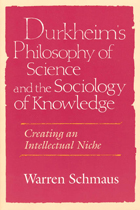
Durkheim's Philosophy of Science and the Sociology of Knowledge
Creating an Intellectual Niche
Warren Schmaus
University of Chicago Press, 1994
In this demonstration of the link between philosophy of science and scientific practice, Warren Schmaus argues that Durkheim's philosophy is crucial to his sociology. Through a reinterpretation of the relation between Durkheim's major philosophical and sociological works, Schmaus argues that Durkheim's sociology is more than a collection of general observations about society—it reflects a richly constructed theory of the meanings and causes of social life.
Schmaus shows how Durkheim sought to make sociology more rigorous by introducing scientific methods of analysis and explanation into the study of society. Durkheim tried to reveal how implicit, commonly held beliefs actually govern people's lives. Through an original interpretation of Durkheim's landmark writings, Schmaus argues that Durkheim, in his empirical studies, refined both the methods of sociology and a theory about society's shared knowledge and practices.
This book opens a new window on the development of Durkheim's thought and demonstrates how a philosophy of science can inspire the rise of a new science.
Schmaus shows how Durkheim sought to make sociology more rigorous by introducing scientific methods of analysis and explanation into the study of society. Durkheim tried to reveal how implicit, commonly held beliefs actually govern people's lives. Through an original interpretation of Durkheim's landmark writings, Schmaus argues that Durkheim, in his empirical studies, refined both the methods of sociology and a theory about society's shared knowledge and practices.
This book opens a new window on the development of Durkheim's thought and demonstrates how a philosophy of science can inspire the rise of a new science.
[more]
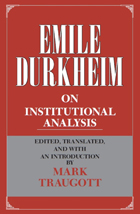
Emile Durkheim on Institutional Analysis
Emile Durkheim
University of Chicago Press, 1978
Ranging from Durkheim's original lecture in sociology to an excerpt from the work incomplete at his death, these selections illuminate his multiple approaches to the crucial concept of social solidarity and the study of institutions as diverse as the law, morality, and the family. Durkheim's focus on social solidarity convinced him that sociology must investigate the way that individual behavior itself is the product of social forces. As these writings make clear, Durkheim pursued his powerful model of sociology through many fields, eventually synthesizing both materialist and idealist viewpoints into his functionalist model of society.
[more]
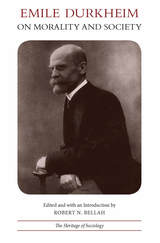
Emile Durkheim on Morality and Society
Emile Durkheim
University of Chicago Press, 1975
Emile Durkheim is best known in this country as a great sociologist and methodologist. Yet it was Durkheim's reflections on morality and society that spoke most deeply of his vital concerns. In his informative introduction to this work, Robert N. Bellah describes Durkheim as moralist, philosopher, theologian, and prophet, as well as sociologist, and the selections in this volume are representative of these aspects of Durkheim's many-faceted scholarship.
The first two selections of the volume set the context for the development of Durkheim's sociology of morality. Section I, "The French Tradition of Social Thought," gives Durkheim's picture of how his sociology is to be situated relative to the general French tradition. Section II, "Sociology and Social Action," shows Durkheim grappling with moral and political issues in his society and indicates the immediate social context of his thinking.
The remaining selections indicate some of the major substantive areas of Durkheim's sociology of morality. Section III, taken from The Division of Labor in Society, demonstrates his basically evolutionary approach to the development of moral norms in society. Section IV, "The Learning of Morality," gives examples of Durkheim's work on socialization. Section V, "Social Creativity," deals with the important question of how new moral norms arise in society.
The first two selections of the volume set the context for the development of Durkheim's sociology of morality. Section I, "The French Tradition of Social Thought," gives Durkheim's picture of how his sociology is to be situated relative to the general French tradition. Section II, "Sociology and Social Action," shows Durkheim grappling with moral and political issues in his society and indicates the immediate social context of his thinking.
The remaining selections indicate some of the major substantive areas of Durkheim's sociology of morality. Section III, taken from The Division of Labor in Society, demonstrates his basically evolutionary approach to the development of moral norms in society. Section IV, "The Learning of Morality," gives examples of Durkheim's work on socialization. Section V, "Social Creativity," deals with the important question of how new moral norms arise in society.
[more]
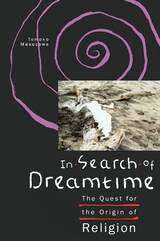
In Search of Dreamtime
The Quest for the Origin of Religion
Tomoko Masuzawa
University of Chicago Press, 1993
In this pioneering work of discourse analysis, Tomoko Masuzawa observes that the modern study of religion is peculiarly ambivalent toward the question of origin. Today's historians of religion maintain that they have abandoned speculative quests for the origin of religion; at the same time, they allege that concepts of absolute beginnings are fundamental to religion itself. By renouncing the desire for origins that they claim religious peoples embrace, historians can vicariously participate in the forbidden quest—so it seems—without forfeiting the authority accruing from their objectivist position.
This ambivalence of contemporary scholars echoes their ambivalence toward the ancestral "giants" of the discipline: Durkheim, Müller, and Freud. Masuzawa shows that the speculations of these three men on the origins of religion render the very notion of time and history problematic and contain powerful instruments for dislodging the position of "Western man" as the keeper of knowledge. Her critical rereading of these forefathers is framed by a compelling discussion of the postmodernist subversion of absolute origins in the works of Walter Benjamin and Rosalind Krauss and a comparison of Mircea Eliade and Nancy Munn's accounts of the Australian aboriginal "dreamtime." Engaging a number of critical issues within the burgeoning field of cultural studies, Masuzawa's book will have far-reaching implications not only for religious studies but throughout the human sciences.
This ambivalence of contemporary scholars echoes their ambivalence toward the ancestral "giants" of the discipline: Durkheim, Müller, and Freud. Masuzawa shows that the speculations of these three men on the origins of religion render the very notion of time and history problematic and contain powerful instruments for dislodging the position of "Western man" as the keeper of knowledge. Her critical rereading of these forefathers is framed by a compelling discussion of the postmodernist subversion of absolute origins in the works of Walter Benjamin and Rosalind Krauss and a comparison of Mircea Eliade and Nancy Munn's accounts of the Australian aboriginal "dreamtime." Engaging a number of critical issues within the burgeoning field of cultural studies, Masuzawa's book will have far-reaching implications not only for religious studies but throughout the human sciences.
[more]
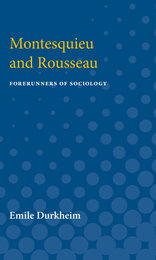
Montesquieu and Rousseau
Forerunners of Sociology
Emile Durkheim
University of Michigan Press, 1960
Montesquieu & Rousseau provides, for the first time in English, two essays by Emile Durkheim on his chief eighteenth-century predecessors in the main stream of Western thought. Durkheim recognized that Montesquieu had laid down the principles of sociology long before that young science had a name and that Rousseau, too, spoke as a sociologist in The Social Contract. With his characteristic blend of reason and fervor, he enlarged upon these forerunners to create the fundamental ideas of modern sociology. The essays are valuable for what they tell us of Montesquieu and Rousseau. They are doubly important to readers who are directly concerned with political philosophy and social science. And, as Henri Peyre points out in the Foreword, they are an example of how the best minds of any age can serve each other.
[more]
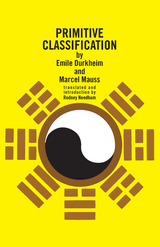
Primitive Classification
Emile Durkheim and Marcel Mauss
University of Chicago Press, 1967
Emile Durkheim and Marcel Mauss maintain that society is the source of the very categories of human thought. First published in the Année Sociologique in 1903, this classic essay has been translated by Rodney Needham, who also provides a critical introduction.
"[Primitive Classification] will impress the reader with its quiet elegance, its direct, logical form, its clarity of style, its spirit of careful, yet bold, exploration."—Harry Alpert, American Journal of Sociology
"Particularly instructive for anyone who wonders what social anthropology is: how, if at all, it differs from sociology and whether it has any unifying theoretical problem."—F. K. Lehman, American Sociological Review
"[Primitive Classification] will impress the reader with its quiet elegance, its direct, logical form, its clarity of style, its spirit of careful, yet bold, exploration."—Harry Alpert, American Journal of Sociology
"Particularly instructive for anyone who wonders what social anthropology is: how, if at all, it differs from sociology and whether it has any unifying theoretical problem."—F. K. Lehman, American Sociological Review
[more]
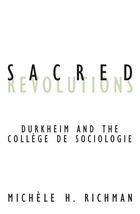
Sacred Revolutions
Durkheim And The College De Sociologie
Michele H. Richman
University of Minnesota Press, 2002
Explores the role of the sacred in the response of French intellectuals to the rise of fascism during the 1930s.
How is it that the most radical cultural iconoclasts of the interwar years-Georges Bataille, Roger Caillois, and Michel Leiris-could have responded to the rise of fascism by taking refuge in a "sacred sociology"? This is the question that Michèle H. Richman poses in a work that examines this seemingly paradoxical development. Her book traces the overall implications for French social thought of the "ethnographic detour" that began with Durkheim's interest in Australian aboriginal religion-implications that reach back to the Revolution of 1789 and forward to the student protests of May 1968.
Richman argues that by revising a phenomenon at once as familiar and as exotic as the sacred, these intellectuals forged a point of view relevant to politics, art, and eroticism in the modern period. Assimilating sociology to this revised notion of the sacred, they revitalized a critical discourse based on anthropological thinking dating back to Montaigne and culminating in Rousseau. Her work thus supplies an important chapter in the history of the human sciences while demonstrating the formation of an innovative critical discourse that straddles literary theory, social thought, and religious and cultural studies.
Michèle H. Richman is associate professor of French studies at the University of Pennsylvania.
[more]
READERS
Browse our collection.
PUBLISHERS
See BiblioVault's publisher services.
STUDENT SERVICES
Files for college accessibility offices.
UChicago Accessibility Resources
home | accessibility | search | about | contact us
BiblioVault ® 2001 - 2024
The University of Chicago Press









